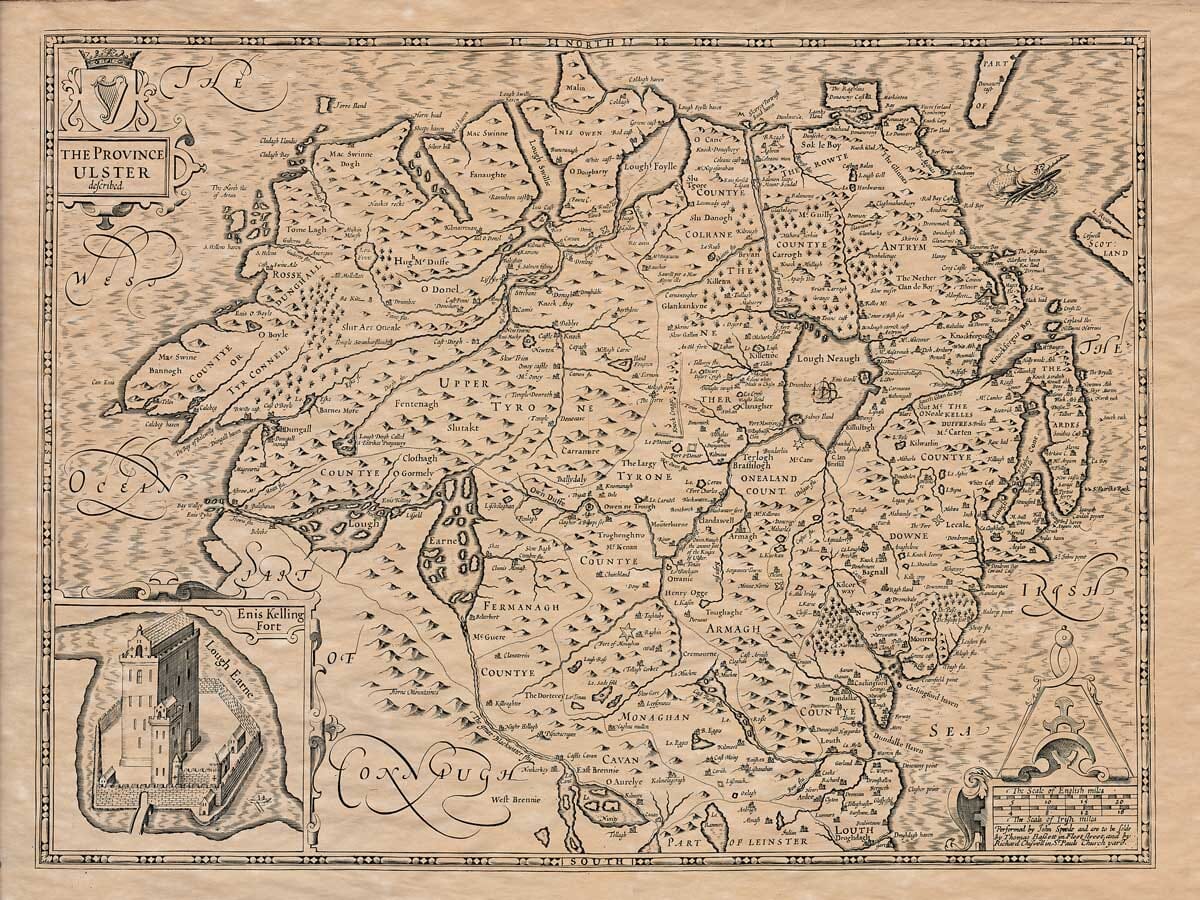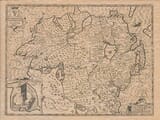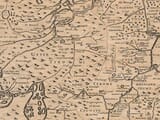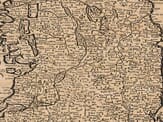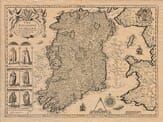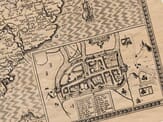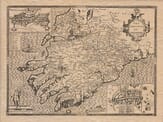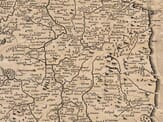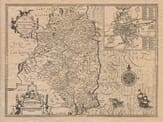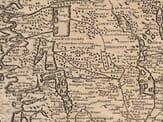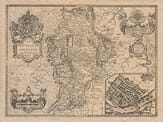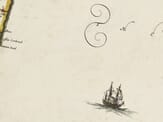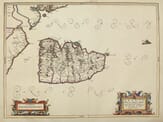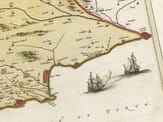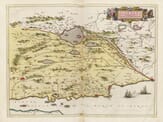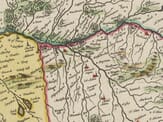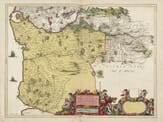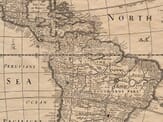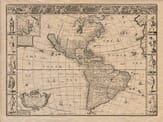Description
The Province of ULSTER
from the verso of John Speed’s map of 1600 and forming a useful historical reference.
The bounds of Ulster.
This Province, called by our Welsh Britains, Ullyn, in Irish Cuinack, in Latin Ultonia, and Vlidia in English Vtlster; on the North is divided by a narrow Sea from Scotland; Southward it extends it self to Connagh and Leinster; the East part lieth upon the Irish Sea; and the West part is continually beaten with the boisterous rage of the main West Ocean. This Province and furthest part of Ireland affronteth the Scottish Islands, which are called the Hebrides, and are scattered in the Seas between both Kingdoms; whose Inhabitants at this day is the Irish Scot, successour of the old Scotian.
The form.
(2) The form thereof is round, reaching in length from Colrags Haven in her North, to Kilmore in her South, near an hundred miles; and in bredth from Black Abbey in her East, to Colrags point in her West, one hundred thirty and odd miles: The whole in circumference, about four hundred twenty miles.
The air.
(3) This Country seldom feeleth any unseasonable extremities, the quick and flexible winds cooling the heat of Summer, and the soft and gentle showers mollifying the hardnesse of the Winter. Briefly, the frozen nor torrid Zone have not here any operations; the clouds in the air are very clear and pleasant, yea, and when they are most importune and unwholesome, not of long continuance; the rough winds holding them in continual agitation.
The Soil.
(4) First, in the equal temperature of the coast, the ground is brought forth great store of several Trees, both for building and bearing of fruit; plentiful of grass for breeding of Cattle, and is abundant, fertil, and much holme for plow. Sheep and Oxen; the Rivers likewise yield double tribute, for pleasure and for profit; very vales for pleasure of sport, and Fish of store, both for their own sustenance and for trade abroad of others. Salmons in some Rivers of this Country are gotten more in number then in any part else of Europe.
Plenty of Salmon.
To speak (in general) though in some places it be somewhat barren, troubled with Loughs, Lakes, and thick Woods, yet is it every where fresh, and full of Cattle and Forage, ready at all times to answer the husbandman’s pains. But Nature is here so little beholden to Art or Industry, that the various hews upon Banks, the shady Groves, the green Meadows, hanging Hills and Fields fit for Corn (if they were manured) do seem to be angry with their Inhabitants for suffering it to grow wild and barbarous through their own negligence.
Negligence of the Inhabitants.
(5) This Country in Ptolemy’s days was wholly possessed by the Vellani, Darnii, Robogdii, and Erdini, who branched and spread themselves into the several parts of that Iland.
(6) The people of this Province were accustomed in controversies and solemn protestations, to swear by S. Patrick’s Staff, which oath they feared more to break, than if they had sworn by the Holy Evangelists. Their ancient custom in making their King was this: A white Cow was taken, which the King must kill, and seeth the same in water, wherein the man must bathe himself naked; and sitting in the Cauldron wherein it was sod, accompanied with his people round about him, they are all to eat of the Flesh and drink of the Broth, wherein he sat, without Cup, or Dish, or use of hand. How far these superstitions and ceremonials were different from the ceremonies of other civil Monarchies, we may well perceive by these and the like observations of those gross times; and as they are more barbarous then in any other part of the Iland beside.
S. Patrick’s Staff.
Their custom in creating a King.
(7) Historians relating of Ireland tell of several Islands in several Provinces: some full of Angels, some full of Devils; some for one day only, some for ever. In some none may live, some where none can die; and some full of trees, flowers, and waters, that seem to smile. Yet of certainty we may well esteem that as a fable, as an headless accusation.
S. Patrick’s Purgatory is a thing of much note in the West of this Province; as well for the narrow cave in the ground, near a Lake (called Lough Erne) opening into a region of ill air, out of which vast streams issuing, promise marvellous apparitions, or rather fancies of devised thought (which, as some ridiculously deem, was digged by Vulcan’s own tools, commonly painted in Hell). This is now in the hands of the Friers Eremites, called Augustines, who have divided the place into two parts; the one called the Paradise, which is the Isle of Purgatory, and S. Patrick’s Purgatory; to enter into which, great devotion is used.
To enter into S. Patrick’s, one taketh hearty penance, with that name labouring the conversion of the whole Iland to Christ’s Faith; and much increasing it to one only. His Purgatory is also now nothing like in use for merit of works, but only kept for the people’s credulity, joys and pains. The rest is only kept for the Friers to get their profit by preaching, imposing penance, and shewing their visions.
Whereupon (as they say) he obtained at God’s hands by earnest prayer, that the punishments and torments which the godless are to suffer after this life, he might in part shew, fenced to the eyes, that so he might move easily to root out the sins and heathenish errors, that took such root in the Irish. But touching the credit hereof (although some be named, and some records do utter it) neither ought it be held for more certain, it is but no Article of our Creed.
Matters memorable.
(8) Matters memorable within this Province are these; that the Bishops of Ireland were wont to be consecrated by the Archbishop of Canterbury, in regard of the Primacy which they had in this Country; until such time as Pope Pius the Second, Cardinal was sent thither from Eugenius the Fourth, to reform Ecclesiastical discipline in this Iland, which was then grown so loose, that there were translations and pluralities of Bishopricks, according to the will and pleasure of the Metropolitan. After that the Irish were unaccustomed to leave and forsake their wedded wives, and Priests were permitted to marry.
Lanfranc complained unto Terdelvacus, King of Ireland, and moved this Nation (because it was thought lawful unto them) to forbear their wives, and so from thence forward had been more certain among them; and the Gentry and Commonalty had no such cruel murders among themselves, which oftentimes fell upon kindreds, blood, and cousins upon such causes of legitimacy.
(9) Three principal places in this Tract all shown on the old map being: Armagh, near unto the River Kalla, which anciently was called the chief Archbishop’s See, and Metropolitan of the whole Iland. Before S. Patrick had built there a fair City, of good form, quantity, and compasse, modelled out (as he saith) by the appointment and direction of Angels, it was then named Droumsaleth; the Irish tell you, much that it received the name of Queen Armacha: but the better opinion is, that it is the same which Bede calleth Dearmach, and out of the abundance of fruit and fair wood was termed in the Irish tongue The Field of Oaks.
Armagh.
S. Patrick.
S. Patrick, the Apostle of Ireland ruled in his time, and settled that ancient honour which it now holds of such venerable estimation in old time, that not only Bishops and Priests, but Kings also and Princes were (in general) subject to the Metropolitan there, in all obedience, and to his government alone.
The Archbishop of this Province S. Malachy is famous, of whom S. Bernard reporteth his pilgrimage in Ireland; and S. Bernard himself, who wrote his life at large, borrowed some of the native barbarousness of that Country, then among the fables of the Seas.
Also here is seen the Fall of Rerish, commonly called The Salmon’s Leap, of famous memory; who tumbled the edge of this huge and violent water-dash, in the year 1353.
The Exil Killings.
The Exil Killings, defended by the Rebels in the year 1593; and won by Dundalke, a walled Fort in this Tract; and in Kells, defended by the same in the year 1594: one of which is a monument in great estimation; near unto which is a great downfall of a sweet current named Salmon-Leap; in which there is a constant report, very dangerous in the waters, that a man is sucked into a Lake, for some filthy abominable acts of the people against Nature committed therein.
(10) In this Province, where Religion is professed in most orderly services, and contrary to holy purposes, certainly profane.
Places of Religion.
The Monastery of Derry, where the Irish Rebel Shane O’Neale took such an overthrow by Edmond Sandals, renowned for his service in the behalf of the Crown of England, as never after he recovered his strength at that time: The Monastery near the Bay of Knockfergus; The famous Monastery of the Abby of Mellifont, builded and endowed by O’Cather, called Baroch; of the Abby in England, near unto Chester, and sent hither by Malachy, King of Ulster, and confirmed by the Pope; as also the famous Monastery of Dundalke; and Rathmullan in the year of our Lord 1500.
(11) These and many such like Monasteries were founded and builded both in Britain and Ireland, in places remote far and near, respected and sought unto by great concourse of people from all parts; the which for the most part at this day, through the negligence of the former founders, are overgrown, decayed, and in the ruins of their buildings.
(12) Those of this County of Ulster are to be kept within the bounds of their civility; for this Province hath rich and well stored Pastures for Cattle, and is not bare to good Corn, but needing their Market towns appointed, being Counties of Tyrone, Donegal, Fermanagh, Cavan, Colrane, Armagh, Lough, &c.

The verso of John Speed’s old map of Ulster

